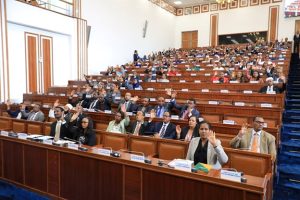
Prime Minister Dr. Abiy Ahmed recently visited Khartoum to mediate political forces in Sudan, a visit that followed the invitation of Sudanese Transitional Military Council Head Gen. Abdul Fattah Al-Burhan.
Dr. Abiy reaffirmed Ethiopia’s support, respecting Sudan’s sovereignty, for an inclusive and peaceful transition. Political science and international relations scholars argue on the necessity of such mediation, suggesting ways and means to better effectuate the supports.
Jigjiga University Political Science and International Relations Instructor and Chairperson of Ethiopian Political Parties’ Joint Council, Moussa Omer describes the effort as a must do task to stabilize the Horn region in general and Sudan in particular.
“Ethiopia is mediating based on the offer for mutual benefits of the two,” Moussa said. Efforts like this should be understood as discharging both bilateral and regional responsibilities; he added noting that the horn countries are supposed to engage themselves even much better than what is being done. “If the far-away countries prefer silence, we the neighboring countries need to break it and mediate to stabilize the region,” he notes.
Ethiopia is required to mediate among the parties in a manner that respects sovereignty of Sudan; he suggests augmenting it with: “And country ought to opt for impartial cooperating partners.” As well, he notes that the negotiation approach has to be very diplomatic and free of any bias; and it needs not be dictating what to do but supplementing with better alternatives.
“There should also be mechanism for gauging and defending the region least external elements that may pursue ill interests interfere. The process must not develop loophole to those who are interested in either to interfere or insist others interference.”
Political Science and Strategic Studies Scholar, Yemaneh Zeray also believes that Ethiopia has more responsibility for the Sudanese stability than any other country as a neighbor with age-long relations.
To him, the country’s history of diplomacy and foreign affairs policy is a clear depiction to this assertion. “Ethiopia has never interfered in any nations internal affairs; but if there has come a need to assign peacekeeping force, it has been the front runner.”
Ethiopia is doing mediation but not arbitration, Yemaneh furthered including: “Though Ethiopia cannot solve the entire problems which may occur between the political forces, it can facilitate the negotiation through discussions but should watch on other interferences.”
Likewise, other experts previously told The Ethiopian Herald that despite the strong bilateral relations, scholars have advised for being sharp enough to monitor matters in the Horn including the current state of Sudan. What happened in Sudan definitely will redefine the geopolitical dynamics in the Horn.
The change being witnessed in Sudan requires a close watch and careful assessment, says Leulseged Girma, a geopolitical researcher at Foreign Strategic Relation Studies Institute, signaling that the partnership between Ethiopia and Sudan is placed on strong foundation, he underscores.
“There are multiple interests and actors in the region that demand Ethiopia to continue positioning itself on the right path and pursuing warm relations with Sudan.”
“There are common concerns including arms trafficking and borders, these and other economic security issues which the two countries are expected to collaborate, not to mention Grand Ethiopian Renaissance Dam and other infrastructural projects.”
Luelseged also notes Ethiopia as member of the African Union and Chair of the IGAD could help the transition in Sudan in many ways in manner that respects the sovereignty of Sudan.
Dr. Nega Solomon, Political Science Lecturer at Axum University says what happens in Sudan has a mammoth effect and implication in the Horn African geopolitical dynamics and the reason behind the mediation is non-indifference. “Both countries share common destines in economic, social and other aspects and it behoove the two countries to keep the momentum for their common good.”
While the Sudanese people have the uncontested share in the internal matters, neighboring countries should play positive role that would contribute to the peace and stability of not only Sudan but also the whole region.
The good thing is that the bilateral ties between Addis Ababa and Khartoum are strong enough that it never gets into trouble as a result of political change be it in Ethiopia and Sudan. Amb. Mohamud Dirir, advisor to the Ministry of Foreign Affairs and currently Ethiopian special envoy to Sudan, says seating at the epicenter of a very strategic area; Sudan is an important Ethiopian ally.
Both countries have lots of joint matters in areas of economic integration, border issues and others. Hence the mediation should be dealt carefully and wisely. Mohamud also notes Ethiopia’s contribution to Sudanese transition depends on how the Sudanese people want it to be.
The Ethiopian Herald, June 14/2019
BY DIRRIBA TESHOME





